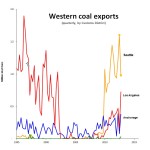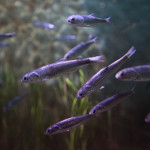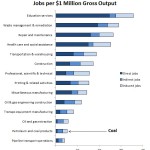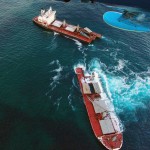Search Results
-
Recent Coal Export Trends: Q4 2012
Nationally, the big story was that coal exports fell for the second consecutive quarter. By the end of 2012, quarterly shipments were down by 25 percent from the historic highs registered during the second quarter. Still, at 28 million tons, coal exports remained very high by historical standards. A bit player in the national coal export story, the Western Customs District exported a little more than 2.1 million tons in...Read more » -
Weekend Reading 4/12/13
Nicole Why are foods so “crazy” or “loco” these days? Here at the office, we have ongoing conversations around nutrition, public health, and the limits of willpower. It looks like we’re not the only ones, but this isn’t quite what I’d envisioned: “People like to balance virtue and vice,” says Chintagunta. “They’ll say, ‘During the week, I was a good person. I ate my lettuce, I ate my salad. Now...Read more » -
Some Good News on “Frankenfish” and GM Foods
On March 20, 2013, Whole Foods, Trader Joe’s, and Aldi, together comprising 2,000 stores coast to coast, pledged they would not sell genetically modified (GM) salmon, even if the US Food and Drug Administration (FDA) approves that new beast for consumption by humans. The supermarket chains made clear that their policy responds to consumer and other citizen groups opposed to the fish. A spokeswoman for Aldi, a chain with 1,200...Read more » -
Seattle’s Green Stormwater Goals
Recently, the city of Seattle announced a goal to dramatically increase the amount of water treated by rain gardens, green roofs, green streets, permeable pavement and other alternatives that seek to treat stormwater more naturally instead of carry it away in pipes. Right now, as the graphic below shows, the city estimates it’s managing somewhere north of 100 million gallons of polluted runoff with “green stormwater infrastructure,” which helps control...Read more » -
The Real Story of Puget Sound’s Disappearing Herring
Editor’s note: A revised version of this article is available as a pdf. Puget Sound’s Pacific herring are a small fish with a whale-sized slate of problems. Many of the local herring stocks are in decline and despite some localized efforts to save them, their numbers haven’t bounced back. Scientists have identified numerous culprits that have likely contributed to the waning populations, including disease, pollution, increasing numbers of predators, climate...Read more » -
The Reality of Coal Jobs, Canadian Edition
While reading up on Enbridge’s proposed Northern Gateway Pipeline, I came across a table so compelling that I had to share the results. As I’ve pointed out before, coal sector investments are a lousy way to create jobs. It’s true in the US, and particularly in the West. Not surprisingly, it’s true in Canada too. The redoubtable Marc Lee at the Canadian Centre for Policy Alternatives demonstrated as much with...Read more » -
Weekend Reading 3/22/13
Clark Observers in the Twin Cities notice Peak VMT – and raise some good questions about whether local governments ought to be projecting traffic growth. (They don’t seem to be particularly good at it.) In the same vein, Charles Marohn at Strong Towns suggests that we flat-out stop using traffic forecasts to plan new roads: “infrastructure spending should never be in anticipation of growth, but only in support of places...Read more » -
The Biggest Blind Spot of Urban Greens?
I have written in recent months about some of the land-use rules that make inexpensive housing uncommon or illegal: roommate caps, accessory dwelling unit rules, minimum apartment sizes and other rooming-house restrictions. What I haven’t discussed is the towering central obstacle to inexpensive housing—the elephant in the living room. Fortunately, Slate blogger Matt Yglesias has done the job well. His concise e-book The Rent Is Too Damn High explains how...Read more » -
How Coal Affects Water Quality: State of the Science
After a recent spill at a British Columbia marine coal export terminal, the general manager was quoted in a local newspaper saying: There’s a lot of misinformation around coal. Coal is a naturally-occurring mineral. It is not toxic. Leaving aside his non sequitur—plenty of naturally-occurring minerals are toxic—he’s right that coal is subject to a lot of misinformation. There is a lot we should know, but don’t, about coal. For...Read more » -
No Sick Leave = More Germs at Sea-Tac?
Yoseph Diallo’s dad is the one who encouraged him to look for work at Sea-Tac airport, based on stories his family had heard over the years about stable, good-paying jobs with decent benefits. So the 19-year-old was happy to get a job last year as a “ramper,” handling and driving baggage from planes to other parts of the airport. But the reality turned out to be quite different than the...Read more »










